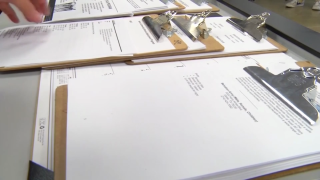
Californians unemployed because of the coronavirus pandemic could soon be getting an additional $300 on top of their current benefits, although details of how it will work aren’t yet clear.
California is one of 20 states, as of Saturday, that have been approved for emergency funding from the Federal Emergency Management Agency as part of its Lost Wages Assistance program.
It’s not yet clear when the funding could be available, though. The agency issued a statement Friday night adding California to the list of approved states to the program. It will likely take some time for the process to be set up, and in a statement FEMA said it "will work with California Gov. Gavin Newsom to implement a system to make this funding available to California residents.”
According to a statement from the state's Economic Development Department, the state will receive an initial $4.5 billion, with the possibility for additional funds in the future.
In order to qualify for the extra money, people will have to be already eligible for at least $100 per week in unemployment benefits and have lost wages due to the coronavirus pandemic. The state said the weekly benefits will last for a minimum of three weeks for those that qualify.
The money to fund the program is coming from the agency’s Disaster Relief Fund, which was part of President Donald Trump’s executive order Aug. 8.
FEMA said it expects the additional benefits to last five to six weeks, depending on the number of states that apply and qualify.
The funding will end if:
- FEMA has expended the $44 billion;
- The Disaster Relief Fund balance reaches $25 billion;
- Congress enacts supplemental Federal unemployment compensation, or similar compensation, for people unemployed due to COVID-19, or
- December 27, 2020
The program allowed for states to add another $100 as part of the allocations, but Gov. Gavin Newsom previously said that the state could not afford that match.
U.S. & World
Arizona, one of the first states approved for the program, began distributing the additional funds this week.
The program is open to all 50 states and the District of Columbia, with approvals coming on a rolling basis as state applications are received.



